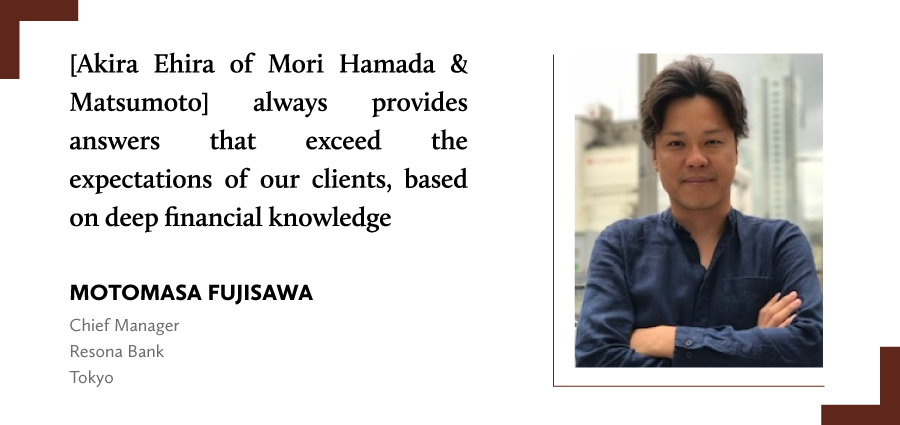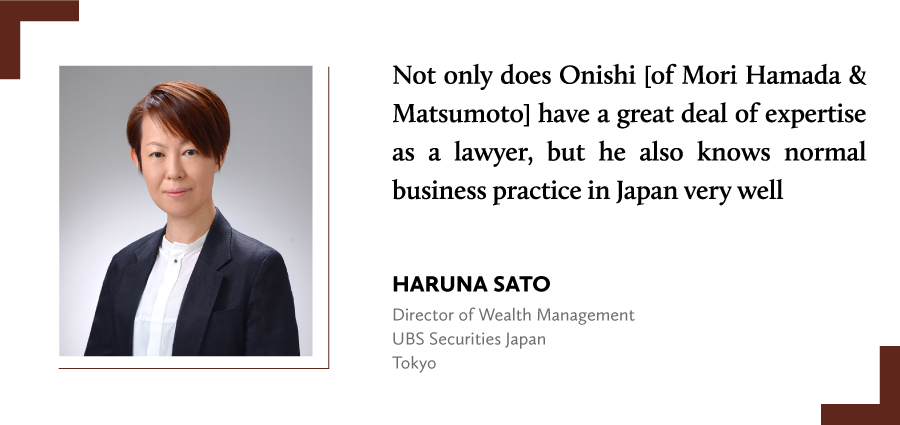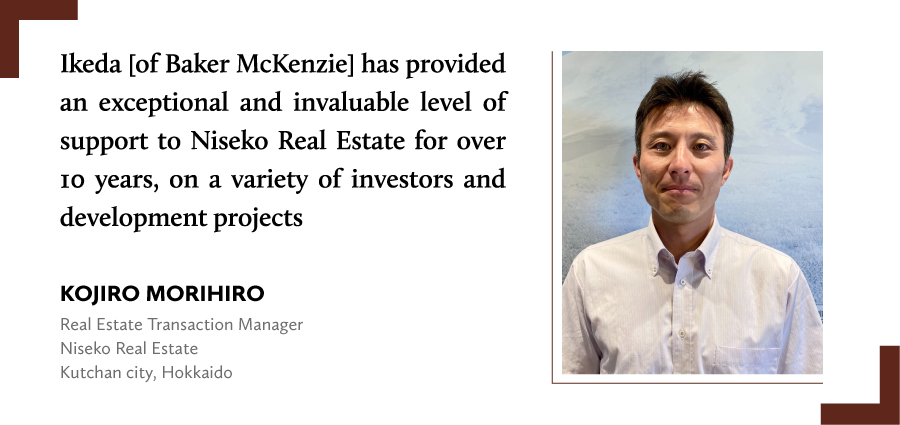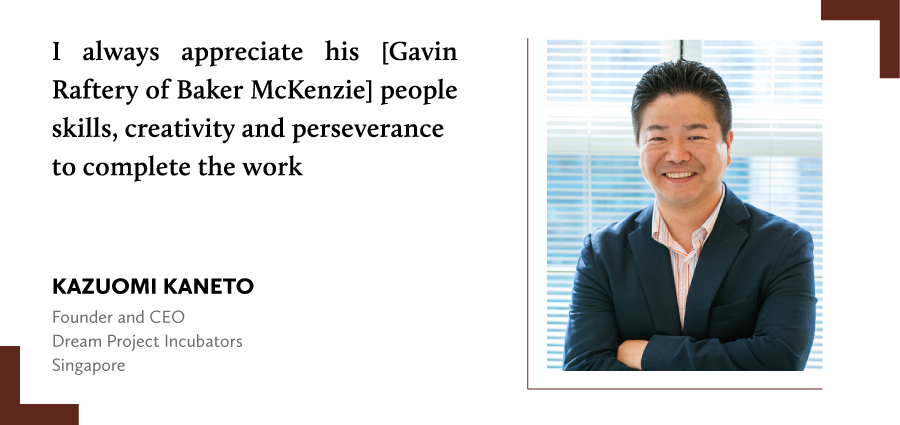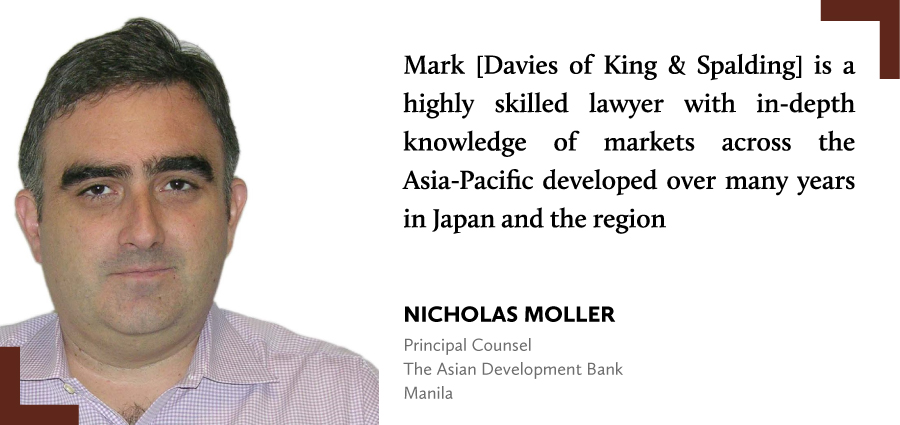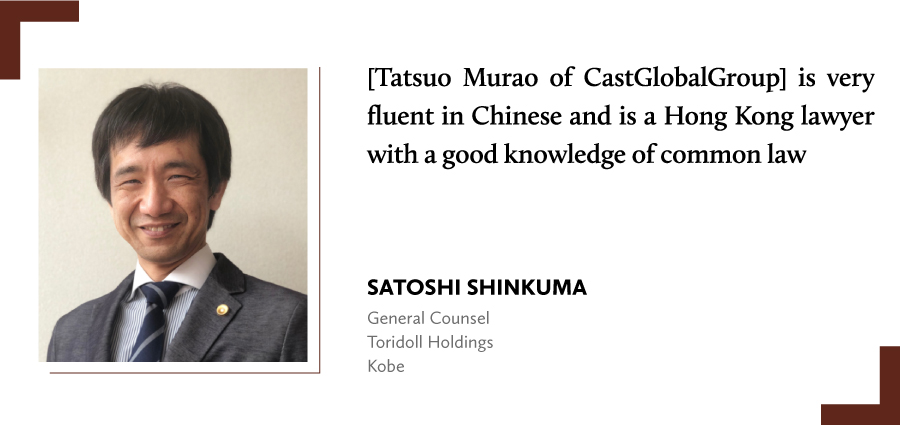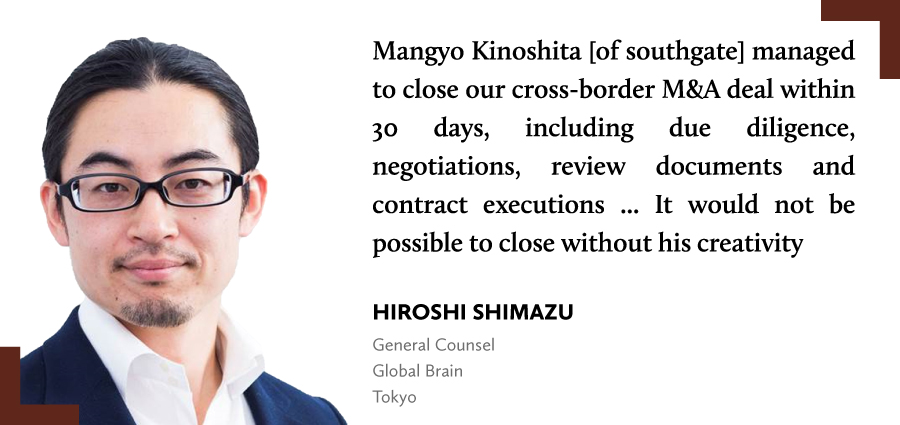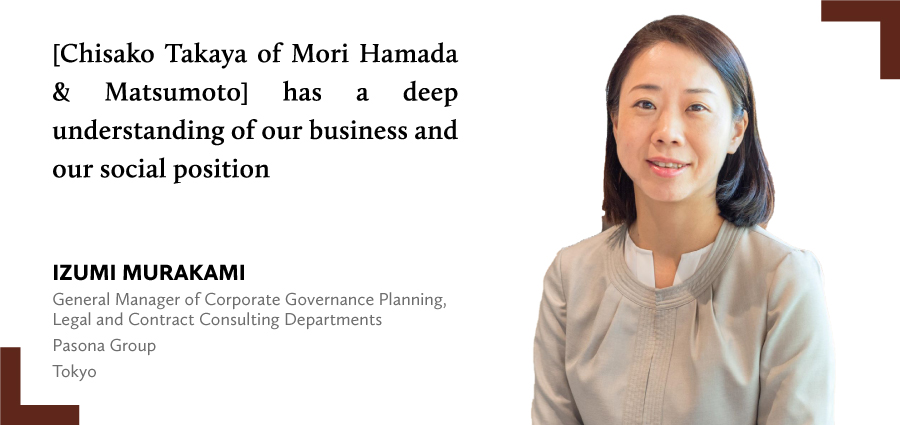Asia Business Law Journal reveals the country’s leading private practice lawyers. Lim Miran and Putro Harnowo report
A steady recovery has helped restrain the damage to Japan caused by the global health crisis. The world’s third-largest economy has been supported by an economic stimulus package and robust co-operation between the government and industry. Still, continuing lockdowns have made it difficult for the country to get back on its feet.
Japan’s GDP shrank by 3.9% in the first quarter this year, slightly better than a 4.6% overall annual decline last year. The government has deployed USD3 trillion to cushion the impact of the pandemic, adding to a debt pile that is already the biggest among major industrialised nations, two-and-a-half times the size of its economy.
On the bright side, the country’s exports rose at the fastest pace, by 49.6%, in May, according to the research released by the Ministry of Finance on 16 June. This trend is primarily driven by a rebound in shipments from last year’s plunge, signalling the pace of recovery from the initial impact of the pandemic.
In the legal landscape, Japan’s government has been keen to attract more overseas lawyers, and amended the Foreign Lawyers Act last year. The amendment reduces the level of experience required for foreign lawyers to be registered in Japan and provides a new category of incorporated law firms called joint corporations, which comprise Japanese and registered foreign lawyers, allowing them to open branches throughout the country.
The amendment also expands the scope for registered foreign lawyers and qualified foreign lawyers to represent parties in international arbitrations and mediations. Furthermore, in March this year, an advisory body for the Ministry of Justice issued interim draft proposals to reform the Arbitration Act to boost the country’s status as a forum for settling international commercial disputes.
Against this backdrop, Asia Business Law Journal presents its A-List of the top 100 lawyers – including foreign legal consultants, advisers and counsel – practising in Japan (see the list of all 100 lawyers and the key practice areas for which they are endorsed here). The list is based on extensive research conducted and nominations received from in-house counsel based in Japan and elsewhere, and Japan-focused partners at international law firms based outside the country.
Most of the A-List lawyers are located in Tokyo, the country’s largest economic zone and finance centre. This may reflect that the finest lawyers are well placed in the capital to have their ear to the ground regarding developments among the financial and sector-specific regulators, and within business centres where various international companies, universities and research institutions are headquartered.
Financial and cross-border advisers
The Japanese financial sector has remained solid during the global economic slowdown. As home to some of the largest banks in the world, the country has seen bustling financial activity and cross-border acquisitions.
In this regard, Shinobu Jitsukawa, executive director at Shinsei Bank in Tokyo, praises Mori Hamada & Matsumoto’s partner, Akira Ehira, for being “familiar with domestic financial regulations and having deep knowledge in the field of structured finance. He is also an adviser as a gatekeeper for all projects.”
Motomasa Fujisawa, chief manager of Resona Bank in Tokyo, agrees. “[Ehira] always provides answers that exceed the expectations of our clients, based on deep financial knowledge.”
Fujisawa also praises Ehira’s colleague, partner Takahiro Kobayashi, for excellence in grasping clients’ needs and having eminent knowledge in the field of structured finance. “He gives advice that benefits the client, especially when the client is about to make a wrong decision, in the composition of the project. I was able to make the right decisions over and over again by referring to his advice.”
Another Mori Hamada & Matsumoto partner, Nobuharu Onishi, is commended by Haruna Sato, director at UBS Securities Japan in Tokyo. “Not only does Onishi have a great deal of expertise as a lawyer, but he also knows normal business practice in Japan very well,” says Sato. ”He advises us in accordance with Japanese business customs, he has good business sense, always thinks of meeting our needs and sometimes modifies his service to suit our needs.”
Shinsaku Toriyama, managing director at Goldman Sachs Japan in Tokyo, applauds Linklaters’ partner Motoyasu Fujita for expertise in derivatives and structured finance regulation. “As a recent example, he helped the industry enormously with the margin regulations implementation process that involved numerous complex cross-border legal issues, through discussions with various stakeholders including the industry participants and regulators,” says Toriyama. “He is client-focused and extremely helpful.”
Nobuharu Sakai, head of legal at Societe Generale Securities Japan in Tokyo, has the same opinion. “Motoyasu Fujita is the best derivatives lawyer in Japan without question, and whenever there are needs to engage external counsel for any derivatives transactions, he is always the go-to person,” says Sakai. “He is a lawyer who can understand what we want to achieve, and provide us solutions in a way that legal risk is mitigated, using his deep knowledge. His solution-oriented skill is especially valued when we want to execute new types of transactions.”
Energy and construction projects
As global markets continue to adapt and rebound, investors have turned to energy and construction projects, which many Japanese lawyers are quite busy with.
Seishi Ikeda, partner and head of the real estate group in the Tokyo office at Baker McKenzie, is recommended by his longstanding client, Kojiro Morihiro, a real estate transaction manager at Niseko Real Estate in Kutchan city, in Hokkaido.
“Ikeda has provided an exceptional and invaluable level of support to Niseko Real Estate for over 10 years, on a variety of investors and development projects,” says Morihiro. “His top-tier professional advice has been a key component in contributing to the company’s ability to efficiently and confidently complete a number of large-scale successful development projects, and his wealth of experience and knowledge has been indispensable.”
Naomi Tofukuji, a representative director at real estate company Pacific Century Premium Developments in Tokyo, agrees. “Seishi is is a person I would contact in every aspect,” says Tofukuji. “He is extremely customer-oriented and dedicates his time to understand fully the guidelines and details not covered by laws, but necessary to deliver accurate advice and service to meet exactly what the client is looking for.”
Ikeda’s colleague, partner Gavin Raftery, is also applauded for his mastery by Kazuomi Kaneto, the founder and CEO of Dream Project Incubators in Singapore, a renewable project developer and investor in clean energy businesses in Asia. “[Raftery’s] diverse practice and vast experience covering acquisitions and project finance, and his broader networking help global firms like my group to have better strategies for legal and financial complications, and smooth execution of our project developments,” says Kaneto. “I always appreciate his people skills, creativity and perseverance to complete the work.”
Another lawyer who is applauded for his work in energy projects is King & Spalding partner Mark Davies, who led the firm’s team advising the Asian Development Bank (ADB), the Japan Bank for International Co-operation, and commercial lenders on financing for a 2,500MW power plant in Chonburi, Thailand.
Nicholas Moller, principal counsel at ADB in Manila, says that Davies’ expertise navigated lenders successfully through the complex maze of issues on the project to achieve a timely financial close. “Mark is a highly skilled lawyer with in-depth knowledge of markets across the Asia-Pacific developed over many years in Japan and the region,” says Moller. “He has a very commercial approach to his work and can always see the big picture, which helps to efficiently close project finance transactions.”
John Popham, general manager in Tokyo at wind farm developer Japan Wind Development, also acknowledges Davies for his commercial mindset, which he says has been invaluable in negotiations and “has resulted in better contractual terms than we would otherwise have obtained”.
“Moreover, he is extremely diligent and motivated in ensuring a beneficial outcome for his client,” says Popham. “In short, there is no lawyer I would rather have beside me when negotiating important contracts.”
Yuhei Yamaguchi, the president and CEO of Japan-based real estate company Unizo Holdings in Tokyo, has this to say about Masakazu Iwakura, a senior partner at TMI Associates: “He is a person who always spares no effort to understand the current situation of our company deeply, and can provide legal advice according to the situation in a timely and appropriate manner.”
In Hong Kong, Derek Fong, senior vice president of business development at Asia-based private investment firm Pacific Century Group, also expresses satisfaction with Iwakura, who has been the company’s legal adviser for many years. “His team works closely with us on a number of matters, ranging from real estate transactions to investment opportunities in the insurance and financial services sector,” says Fong. “He is a strong leader, responsive, and has up to date knowledge on the regulatory framework in Japan.”
The big guys
Working in the legal industry is never easy and rising to the top is even harder, but some have made real names for themselves to lead or establish their own offices.
One of them is Tatsuo Murao, founder and CEO of CastGlobalGroup, who is nominated by Satoshi Shinkuma, general counsel at restaurant and franchise operator Toridoll Holdings in Kobe, for his cross-border skill. “He is very fluent in Chinese and is a Hong Kong lawyer with a good knowledge of common law,” says Shinkuma. “He is very proactive in making suggestions to us.”
Outstanding legal acumen, though, is sometimes not enough to be trusted by clients. They require creativity, just as Hiroshi Shimazu, a general counsel at independent venture capital firm Global Brain in Tokyo, describes Mangyo Kinoshita, the founding partner at southgate law firm.
“Mangyo Kinoshita managed to close our cross-border M&A deal within 30 days, including due diligence, negotiations, review documents and contract executions,” says Shimazu. “It was not a huge deal, but the buyers and the sellers are located in multiple countries, and it is fairly complex. It would not be possible to close without his creativity.”
Akira Mori, head of the legal and corporate strategy department at Japanese special effects studio Tsuburaya Productions in Tokyo, has this to say about Ryan Goldstein, partner and head of the Tokyo office at Quinn Emanuel Urquhart & Sullivan: “Ryan and his team gave us the most important result in winning a judgment in our legal trial in the US. They were very reliable in terms of keeping us confident in our proceedings, and would explain anything that we did not understand, or had doubts with.”
Masa Suekane, managing director at Bain Capital in Tokyo, is all praise for Tsuyoshi Imai, managing partner of the Tokyo office at Ropes & Gray. “I think Tsuyoshi is a great lawyer who has not only technical knowledge and negotiating power, but also good commercial judgement to assess the risk-and-return profile of legal or structuring-related issues in the big picture of deals,” he says.
Female contenders
Seeing women in powerful roles in the conservative world of Japanese business is still a rare sight, and the same can be said about the country’s legal industry. As Japanese society opens up, and more people are espousing gender equity, more women are fighting their way into the profession and earning respect from their clients, including 14 female lawyers who are on our A-List.
Izumi Murakami, general manager of corporate governance planning, legal and contract consulting departments at Japanese recruitment firm Pasona Group in Tokyo, applauded Chisako Takaya, a partner at Mori Hamada & Matsumoto, for her advice in a labour-related dispute and in designing a personnel system. “She has a deep understanding of our business and our social position,” says Murakami. “Her advice is clear and reliable. She is a reassuring lawyer for us.”
Maya Ito, a partner at Nishimura & Asahi, is praised by Guy Lachmann, senior partner and chair of Japan practice group at international law firm Pearl Cohen in Tel Aviv. “Maya is highly professional, responsive, motivated, an excellent fit to lead a non-Japanese client in doing business in Japan, or with Japanese businessmen,” says Lachman.
Other prominent women who made it onto the A-List include: Atsumi & Sakai senior partners Miho Niunoya and Setsuko Yufu; TMI Associates’ veteran lawyers Mie Fujimoto, Mitsue Aizawa and Mitsuko Miyagawa; Clifford Chance co-managing partner Reiko Sakimura; Baker McKenzie partner Junko Suetomi; Gaien Partners’ partner Satoko Kuwabara; Mori Hamada & Matsumoto partner Eriko Ozawa; and Nagashima Ohno & Tsunematsu partners Miyuki Ishiguro, Kaoru Hattori and Yuko Tamai.
Compiling the A-List
The A-List is based on extensive research conducted by Asia Business Law Journal. To identify the top 100 lawyers in Japan, we turned to thousands of in-house counsel in Japan and around the world – as well as partners at international law firms – and asked them to tell us which lawyers should make the cut, and why.
Nominations were made by professionals at a wide range of Japanese and global companies, financial institutions and law firms, including: Asian Development Bank, Bain Capital, Citi, Credit Suisse, Deloitte Tohmatsu Financial Advisory, Dream Project Incubators, East Bridge Renewable, Farallon, Global Brain, Goldman Sachs Japan, Ito En, Japan Wind Development, Lone Star Funds, MARKTEC Corp, Mitsubishi UFJ Trust and Banking, Niseko Real Estate, Pacific Century Group, Pacific Century Premium Developments, Pasona Group, Pearl Cohen, Remixpoint, Renesas Electronics, Resona Bank, Romulo Mabanta Buenaventura Sayoc & De los Angeles, Shardul Amarchand Mangaldas & Co, Shinsei Bank, Societe Generale Securities Japan, Sumitomo Mitsui Banking Corporation, Takami, Tokyo Star Bank, TORIDOLL Holdings, Tsuburaya Productions, UBS Securities Japan, Unizo Holdings and many more. Thorough editorial research followed the nomination process.
The final list reflects the nominations received combined with the Asia Business Law Journal editorial team’s extensive experience in documenting and analysing the legal market in Asia. All Japanese private practice lawyers and foreign lawyers based in the country were automatically eligible for inclusion in the nominations process and, as always, there were no fees or any other requirements for entry.
The names and photographs of all 100 A-List lawyers are published on the pages that follow. In addition, each A-List lawyer was given the opportunity to include their biography and contact details, for which a publishing fee was charged.
It is important to note that while the compilation of the A-List was based solely on independent editorial research, the biographies and contact details that appear alongside many of the listings have been written by the participating lawyers, and the content has not been independently verified by Asia Business Law Journal.






